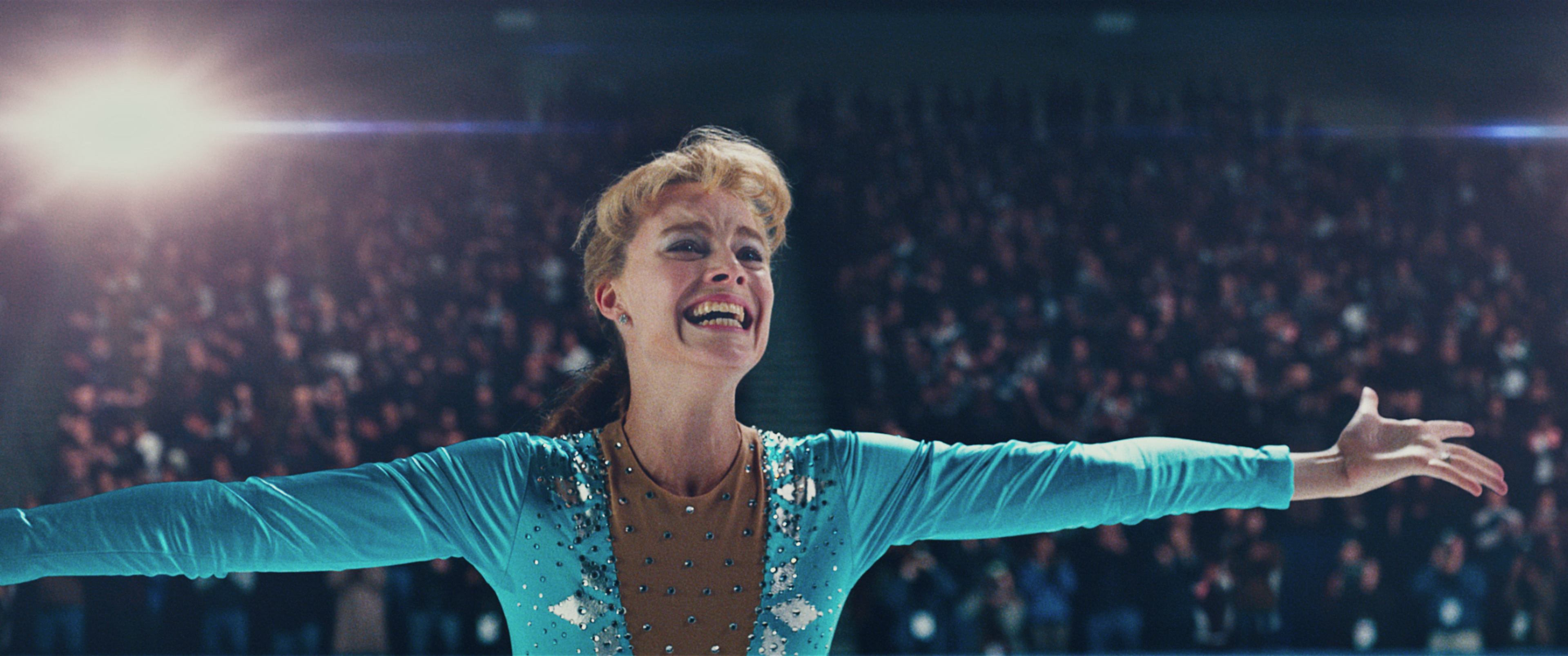Tonya Harding's belated moment to shine
The agony and the ecstasy of the offbeat biopic I, Tonya


A free daily email with the biggest news stories of the day – and the best features from TheWeek.com
You are now subscribed
Your newsletter sign-up was successful
Throughout the offbeat biopic I, Tonya, the infamous Olympic skater Tonya Harding is seen getting smacked around. Her mother LaVona (played with gusto by the multi-Emmy-winning Allison Janney) beats her as a perverse form of motivation. Her husband Jeff Gillooly (well-played by an almost unrecognizable Sebastian Stan) wallops her as a way to show he cares, because she's been raised to expect her loved ones to knock her senseless. At one point early in the film, Harding looks into the camera ruefully, talking about how often she's been slapped, kicked, punched, and tugged in her life.
Then she shakes her head and says, "Nancy gets hit one time …"
"Nancy," as most folks watching I, Tonya should know, is Nancy Kerrigan, the 1994 Olympic figure skating silver medalist — who barely appears in the film, even though there'd be no movie without her. For those who don't know the story (or just need a refresher), in January 1994, one month before the Lillehammer Olympics, Kerrigan was whacked on the knee with a metal rod belonging to a man associated with Gillooly. Harding claimed ignorance of the plan, and was allowed to compete in the games. The melodrama captivated the world, and broadcasts of women's figure skating that year broke ratings records.
The Week
Escape your echo chamber. Get the facts behind the news, plus analysis from multiple perspectives.

Sign up for The Week's Free Newsletters
From our morning news briefing to a weekly Good News Newsletter, get the best of The Week delivered directly to your inbox.
From our morning news briefing to a weekly Good News Newsletter, get the best of The Week delivered directly to your inbox.
Margot Robbie plays Harding in I, Tonya, in a performance almost certain to be nominated for an Academy Award. Robbie doesn't try to impersonate Tonya. Instead, she channels the angry energy of a young woman from a poor Portland, Oregon, neighborhood, who spent nearly her entire career being disrespected by the skating community for her cheap hand-sewn costumes and unapologetic vulgarity. Nevertheless, Harding had a few years when she was one of the U.S.'s top women skaters, because her athleticism was undeniable. She earned her spot.
A lot could've gone awry with the rich, glamorous Robbie playing the battered, working-class Harding. But the actress is neither too cartoonish nor too much the long-suffering martyr. The movie as a whole threads a similar needle, between taking the Harding saga too seriously and treating it like a big joke. Director Craig Gillespie and screenwriter Steven Rogers risked skewing too far to the latter by structuring the film as a kind of mockumentary, having the characters address the camera with sardonic comments as they look back at what happened.
Frankly, before I, Tonya premiered at the Toronto International Film Festival back in September, there was no reason to believe that Gillespie and Rogers could pull off something this entertaining and snappy. The director's previous films have included the raunchy comedy Mr. Woodcock and the instantly forgotten Fright Night remake. Rogers previously wrote the crowd-pleasing dramedies Hope Floats and Love the Coopers. There's little in these resumés that screams "Oscar-worthy."
Of further concern: Handled badly, I, Tonya could've easily become the cinematic equivalent of one of those "forgotten blue-collar Trump voter" profiles that have been drearily ubiquitous in the past year. The movie doesn't disguise its political undertones. Pro-Reagan paraphernalia is prevalent in one scene, and Gillespie and Rogers persistently position Harding and her family as defiant underdogs unfairly mocked by snooty elites.
A free daily email with the biggest news stories of the day – and the best features from TheWeek.com
But the shtick of having different characters tell the story — each with a slightly different perspective on what happened and why — keeps I, Tonya from becoming too much of a populist tract. Throughout, Harding is depicted partly as a victim of circumstance, and partly as a victim of her own gruff exterior and bad choices.
Sometimes the two are inextricable. As shown in the film, perhaps social conditions and LaVona's whippings drove Tonya into Jeff's arms, or perhaps it was just plain old bad taste. Either way, she ends up stuck in the orbit of Gillooly's friend Shawn (hilariously played by Paul Walter Hauser), a self-professed "international terrorism expert" who uses his connections to hire "my top operatives" to assault Kerrigan. The whole scheme was poorly planned and executed, and whether or not Harding knew about it, she had little say in choosing the dopes who carried it out.
She also couldn't have reckoned with the aftermath, which saw her becoming a late-night TV punchline and a staple of both the nightly news and syndicated tabloid shows like Hard Copy. "You're all my attackers too," Robbie's Tonya says to the audience late in the film, in one of the clumsier attempts to make the movie's themes crystal clear. But too-on-the-nose or not, the line's not wrong. The point of I, Tonya is that Harding had been abused since childhood, and that her payoff for surviving was public humiliation.
It would've been very easy to make this film exhaustingly miserable. Instead, Gillespie and Rogers — and Robbie, Janney, Stan, and Hauser, for that matter — find the ironic humor, and even the exhilaration, in Harding's life. It's exciting to watch Robbie-as-Harding skate in this movie, as she enjoys both the amazing things her body can do and the brashness of her DIY clothes and at-times-inappropriate music. Because of those more thrilling moments, it's also heartbreaking when she fails: when her laces snap at a crucial moment, or when she can't land her signature jump.
The Tonya/Nancy story was dredged back up on the 20th anniversary, during the 2014 Winter Olympics. The focus then was largely on the luridness of the whole affair, and how unfair it all was to the champion Kerrigan (who, let's not forget, was also the victim of violence and chicanery she never asked for).
I, Tonya aims for a different kind of retroactive justice. Gillespie and Rogers argue that Kerrigan actually had chances to shine on an international stage that Harding never got. It asks the audience to reckon with why that was, by undercutting nearly every laugh in the film (and there are a lot of laughs) with a shot of Harding getting hit, or waiting tables to make money for costumes, or getting dragged through the mud on TV. This movie becomes Tonya Harding's belated moment to shine ... bruises and spangles and all.
Noel Murray is a freelance writer, living in Arkansas with his wife and two kids. He was one of the co-founders of the late, lamented movie/culture website The Dissolve, and his articles about film, TV, music, and comics currently appear regularly in The A.V. Club, Rolling Stone, Vulture, The Los Angeles Times, and The New York Times.
-
 Local elections 2026: where are they and who is expected to win?
Local elections 2026: where are they and who is expected to win?The Explainer Labour is braced for heavy losses and U-turn on postponing some council elections hasn’t helped the party’s prospects
-
 6 of the world’s most accessible destinations
6 of the world’s most accessible destinationsThe Week Recommends Experience all of Berlin, Singapore and Sydney
-
 How the FCC’s ‘equal time’ rule works
How the FCC’s ‘equal time’ rule worksIn the Spotlight The law is at the heart of the Colbert-CBS conflict
-
 Walter Isaacson's 'Elon Musk' can 'scarcely contain its subject'
Walter Isaacson's 'Elon Musk' can 'scarcely contain its subject'The latest biography on the elusive tech mogul is causing a stir among critics
-
 Welcome to the new TheWeek.com!
Welcome to the new TheWeek.com!The Explainer Please allow us to reintroduce ourselves
-
 The Oscars finale was a heartless disaster
The Oscars finale was a heartless disasterThe Explainer A calculated attempt at emotional manipulation goes very wrong
-
 Most awkward awards show ever?
Most awkward awards show ever?The Explainer The best, worst, and most shocking moments from a chaotic Golden Globes
-
 The possible silver lining to the Warner Bros. deal
The possible silver lining to the Warner Bros. dealThe Explainer Could what's terrible for theaters be good for creators?
-
 Jeffrey Wright is the new 'narrator voice'
Jeffrey Wright is the new 'narrator voice'The Explainer Move over, Sam Elliott and Morgan Freeman
-
 This week's literary events are the biggest award shows of 2020
This week's literary events are the biggest award shows of 2020feature So long, Oscar. Hello, Booker.
-
 What She Dies Tomorrow can teach us about our unshakable obsession with mortality
What She Dies Tomorrow can teach us about our unshakable obsession with mortalityThe Explainer This film isn't about the pandemic. But it can help viewers confront their fears about death.
